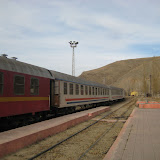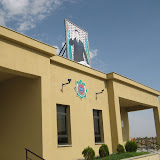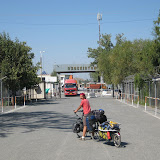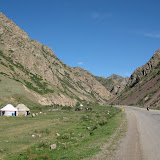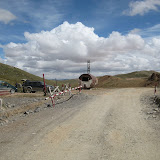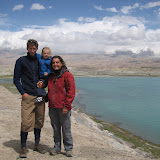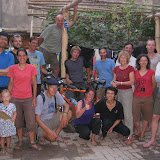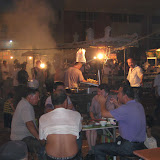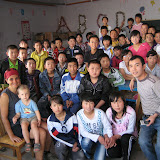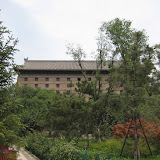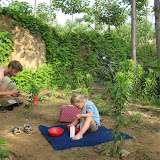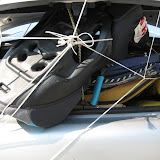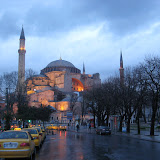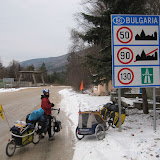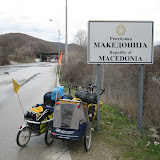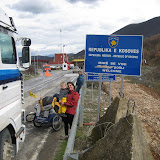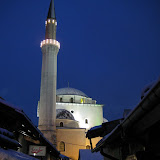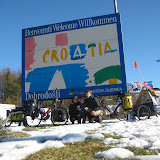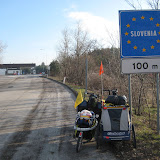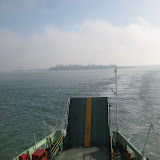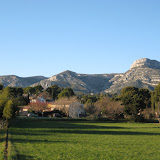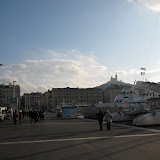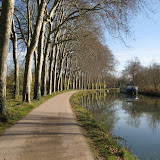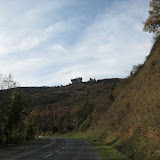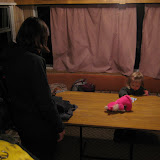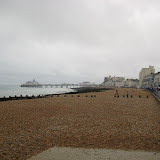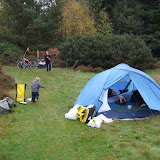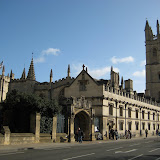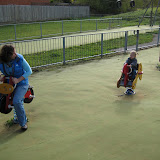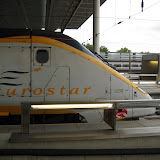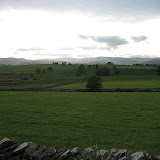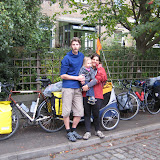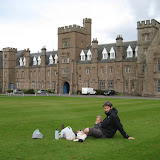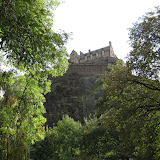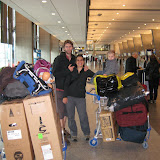I should really write these endless essay's more often but such is life when time never presents itself.
What a bureaucratic month! We are now in Tajikistan after almost 12,000 kilometres ridden and 31 flats. However, we have passed three potentially difficult borders and are still functioning altogether relatively correctly both mentally and physically. Oceanne is slightly sick with a cold which she caught from myself after a rapid visit back to my homeland, more of that later but nothing altogether serious.
The last time l wrote we were still in China. That did not last long as the previously talked about jeep which we were sharing with two middle-aged Americans to share costs duly arrived on the Wednesday morning. We had to tie the majority of our baggage onto the roof including the baggage trailer, both bikes and the majority of the baggage. It's a right pain transporting our lives on vehicles but l think l've already said that before. Compromises have to be made sometimes! This was infact a REAL pain this time as the baggage had to be attached and re-attached not just once, as could be reasonably expected but THREE times! Once, obviously at the beginning and at the end of this mammoth 10 hour journey which as the crow flies did not cover a huge distance but in any case covered an important political one. Twice, to check every single piece of baggage through Chinese customs. This, you do realise is to exit the country, and thirdly to change cars at the official border line as private cars or bikes for that matter are not allowed to pass! We were now in Kyrgyzstan after a little under four months in China and now officially in Central Asia. A region that may not be huge in size but very interesting in it's diversity. Not just in it's peoples but also in it's attitudes to Islam and of course the landscape. Uzbek's for example, especially in the Farg'ona valley in the eastern part of the country are particulary religious but seem to be so open in their daily lives. Not something that always goes together with intensively holy people's. Not in my experience in any case. Personally, the Farg'ona valley is a paradise on earth and all should visit it before you drop off. Do not just fly in, have a look at Samarqand and Buxoro, think you've seen it all and then fly out again. It's green, the food is great, the monuments are historic, grapes grow wherever, the weather is out of this world, the majority of the population is here which means the markets are full and where you are also offered vodka in a cup, a large cup at that while eating in a market, in a town that is very very holy. That is open as far as l am concerned. People greet you by shaking your hand and holding their hand on their heart. That is fine and it is totally genuine. Conversations between men involve a right process before beginning. How's your children, how's your health and then and only then, the news of the day! Attitudes to women may be their biggest fault but everyone's not perfect right?
Kyrgyzstan should come first though. It is true that we were only supposed to originally cross a small distance in the far south of this country but bureaucracy called at this time which created a right mess and our time in this country was dominated by return visits to the capital, Bishkek, some biking, a ridiculous journey to England and back and then a flying and unpleasant car journey to get to Osh and then out of the country. Thankfully by bike. Our time biking in Kyrgyzstan if not under stress was great. It is beautiful if never flat! This is what makes it so majestic however. We biked perhaps 400 km's from Naryn to Karakol; over the 3030 m Dolon pass which was unpaved gravel and a bit bloody hard with the house trailing behind, and then along the deep blue lake of Issyk Kul where we swam! Dorothee was followed by some good hearted children on a difficult section which just goes to show how slow-going it was. The roads were not great and the Kyrgyz drive like crazy in 1990's Audi 100's from Germany and certainly bought on the black market. Aggressive sometimes, if l happen to be standing in the road, nonchalantly of course and obviously in their way and on THE good piece of tarmac and they've had a few too many vodka's. Yurt's were everywhere where the nomad's were selling their fermented horse mare's milk by the road as they set up camp for the summer before moving lower down in altitude for the winter. I regret to say we never tasted it. The closest l came was the tea with milk that l had up in the Pamir's at Lake Karakol with the Chinese Kyrgyz. They all had beautiful horse's and some have large herds of sheep. These summer pastures are called, 'jailoo's' and it is real sound of music country with huge grassy meadows surrounded by mountains but with no fences. Makes it very easy to find a camping spot!
We first went to Bishkek from Kochkor to begin the process for my Uzbek visa and find out how l could acquire a new passport as l only had one free page left in it and that would be for the Uzbek's. We duly began the two week process for the visa by following diligently the manners in which how to properly prepare your documentation. The passport was another matter entirely. The British Consul had recently left to England due to family issues for a period of seven months without a replacement. I ask, where do your taxes go! Too much of this crap is going on in British embassies and consulates around the world and l can assure you it can stop but no-one is surely listening to me. It was an honorary consulate which l think is short for as no-one else can tell me, 'l can't actually help you as l'm lazy and paid too much', so it probably was for the best! The best the Foreign Commenwealth Office could tell me was to send my old passport to Moscow with a birth certificate, application form and the MONEY of course and you SHOULD recieve a new passport in FIVE weeks upon reception and please do not travel during this eternal time. I thought WHAT the F++K. Are you silly, stupid and lacking a brain. I'm not the violent type either! First l coulden't have applied for a new passport in China as you can't enter and leave on different passports and you certainly do not mess with Chinese bureaucracy so this could not have been done earlier. Second, l was travelling and you need a passport as ID in Kyrgyzstan plus the fact that you can only stay in the country a maximum of one month on entry. Third, l don't carry a birth certificate and how do you think l got the original passport. So basically l had a PROBLEM. Not least because we were going to Uzbekistan in three weeks and also needed to begin the process for a third time for the Iranian visa which this time we would try to do with an agent and hence would take a month where they first would need a scan of my new passport! It was the passport office in London that finally gave me the one and only and particularly expensive and crazy option. This was to fly to England with an appointment for 4 hour passport processing and then fly back again. Luckily l like crazy options and also losing perspective of things like money. So this is what l did. Crazy it was, tiring it was and an expensive Aeroflot ticket via Moscow it was. Large debt we surely have but who gives. I have a new passport, the game for the visa for Iran has now started again and we passed the two borders of Uzbekistan and Tajikistan with my old and new passport as the visa's could not be transferred. This was the last hurdle but it proved not to be a problem. I'm still tired a little over a week later but l had a really good time seeing a few priveledged friends in the process. The thing that get's me is that this doeen't need to happen. I was travelling and l had a serious problem. British diplomats are useless especially when l have heard stories of Slovenian and Dutchmen getting a passport abroad while travelling with little issue. Plus, the Irish upstart, who l had the pleasure of talking to on the telephone at 11.30 p.m in a sleepy Kyrgyz town seemed to be trying to do me over. I was trying to arrange this appointment in London and he had the cheek to tell me that l coulden't actually apply for a passport in the UK. His perfect reasoning was that it was because l had abandoned the UK 4 years ago and do not have these priveledges anymore. I put the boy right straightaway l can tell you and he soon saw the error of his way's when he understood my predicament. Before l put him right though he continued on saying that l should have done it in Canada before l left. That is how those consulates are funded! Deluded that is all l can say. I had ten pages left and five years validity. He then said l should have sat down with an adviser to learn how many pages l would be expected to use during the trip. How an earth did l know l would stay for four months in China, use five pages just in China etc etc. All l can say is, seriously deluded. It's these type of process's that make the world so full of profiteering blockheads. Luckily we can still go in search of the great and the genuine which there are still thankfully a huge amount.
It was Ramadam for the most of our time in Kyrgyzstan but it didn't really affect us too much. We had the pleasure of staying with a really nice family in Kochkor where the Mother of the family and her children would spend all the Saterday afternoon preparing a great meal that many people would enjoy after sundown. They apologized profusely in advance for the noise they would make but for the amount of people that were there it was hardly noisy at all. Apart from when we were camping we would stay with a family as most accomodation outside Bishkek is in the form of homestay's and infact the only affordable accomodation in Bishkek is in a homestay/hostel! Otherwise it is European levels. The Kyrgyz in general are very reserved and family life is quite closed even if sometimes Oceanne could play happily with the other children. It was a huge change compared to China. I have never seen such a huge change in culture by crossing a frontier such as China's with Kyrgyzstan. No more Communist controls for internet or what hotel we could stay in! After we had finished biking in Karakol we took an ancient Russian military jeep up into the Arashan valley at 2600 m on what was little more than a very rocky track. The driver was pretty skilled and the jeep perhaps ever more so. Valentine, our Ukranian host had built his own covered hot spring pool next to the charging river in a valley that was well known for it's thermal baths. It was a small piece of paradise even though the weather turned not so great soon after we arrived. The accomadation was basic but to be able to go down to the hot pool upon waking and then a bit of a hike later was a good bit of time together before we put the bikes on a bus to Bishkek again. This time to pick up the Uzbek visa and then fly to England.
Upon my return we were soon packed and prepared to speed to Osh, the famous embattled town 10 hours to the south where the only crossing into Uzbekistan for tourists is open. All border crossings are closed to locals. Strange why they choose Osh as the crossing point between the two countries as only 3 months ago it was the scene of such carnage. Our lift to Osh was with a Kyrgyz man who was a bizarre character but at least we got there. This road it turns out is the best in Kyrgyzstan in terms of surface even though it crosses three huge mountain ranges. I lost a bit of money during the journey and l can still not work it out if it was me or him. Very bad to accuse though. We arrived in the early hours of the morning where l had to pay a small fine at the military checkpoint that guard's the entrance to the town. Supposedly for the baggage on the roof as there was no more space in the boot. Checkpoints still control all entrance's to the town and the burnt houses and business's are very much in evidence. All of them Uzbek. No Central Asian country likes another one and the Kyrgyz want the Uzbek's out but the thing is they have been here the whole time and so essentially they are Kyrgyz but no, it is not that simple. It is all due to Stalin and his creative drawings of the frontiers. Designed to force conflict and it works very well. After a day in Osh we biked to the border and l have never been so happy to enter a country as l did on entering Uzbekistan. Not because it was great as l didn't know it yet but because after all the backwards and forwards of the last month and even my personal doubt of passing this border, we were finally moving with our pedals and we both felt really good. The gates were locked when we arrived at the border but they were opened for us. That was a good feeling but it still, so very really, highlighted the problems that this border has. It was a major bonus that the Farg'ona valley which Osh is also a part of, was such an amazing place. We have since biked right through the valley to Khojand in Tajikistan which is the direct route to the western side of Uzbekistan such is the sense of the Central Asian borders. The borders take two hours to cross and exiting takes just as long as entering as everything is done by hand. We will probably be back in Uzbekistan tomorrow. In the Farg'ona valley we passed through Andijon, Farg'ona town where we saw how they still made silk in nearby Margilan from worm to finished product using the original methods with little or no electricity and then to Kokand with it's impressive Khan's palace and Juma Mosque. We then crossed over to Tajikistan for our two day ride, in headwinds it has to be said but Khojand is a good place to relax for the day, being mainly Uzbek in population and with a really active bazaar. Uzbekistan has really surprised me as a country and l look forward to seeing if the more visited western part suits us like the east did. Fingers crossed for Iran too. If we don't get it after a third time trying then you've just got to give up l suppose. Let's see if the adage of, if you don't succeed then try, try again actually works!
All the best, Rupert,
11,951 km's and 31 flats.


